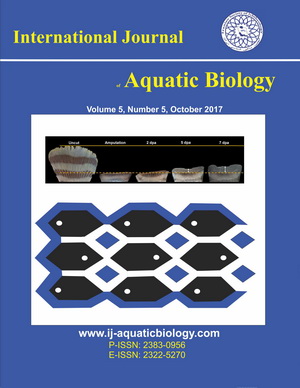Induction of precocious sex reversal in aquaculture: effects of methyltestosterone treatment on gonadal sex of yearling longtooth grouper (Epinephelus bruneus)
Downloads
Groupers, highly valued fish globally, exhibit sex change from female to male during adulthood, posing challenges in obtaining wild males for aquaculture. Inducing female-to-male sex reversal in juvenile groupers can streamline breeding efforts. This study used 17a-Methyltestosterone (MT)-loaded cholesterol pellets to treat one-year-old longtooth groupers (Epinephelus bruneus) and induce small functional males. Gonadal sexuality and male functionality were assessed after one to two months. Initial gonadal changes included efferent duct differentiation. High-dose MT-treated fish exhibited active spermatogenesis. However, no spermiation was observed. This highlights MT's potential for sex reversal but not for complete testicular function. These findings have implications for grouper aquaculture and the management of sex change. Further research should explore methods to optimize functional male induction for sustainable breeding practices.
Downloads
Alam M.A., Nakamura M. (2007). Efferent duct differentiation during female-to-male sex change in honeycomb grouper Epinephelus merra. Journal of Fish Biology, 71(4): 1192-1202.
Bhandari R.K., Komuro H., Nakamura S., Higa M., Nakamura M. (2003). Gonadal restructuring and correlative steroid hormone profiles during natural sex change in protogynous honeycomb grouper (Epinephelus merra). Zoological Science, 20(11): 1399-1404.
Chuda H., Sugano K., Nakatsukasa H., Hattori N., Kobayashi Y., Masuma S. (2022). Induction of sex reversal in longtooth grouper Epinephelus bruneus by implantation of 17-alpha-methyltestosterone cholesterol pellets. Nippon Suisan Gakkaishi, 88(6): 485-493.
Devlin R.H., Nagahama Y. (2002). Sex determination and sex differentiation in fish: an overview of genetic, physiological, and environmental influences. Aquaculture, 208(3): 191-364.
Huang M., Wang Q., Chen J., Chen H., Xiao L., Zhao M., Zhang H., Li S., Liu Y., Zhang Y., Lin H. (2019). The co-administration of estradiol/17?-methyltestosterone leads to male fate in the protogynous orange-spotted grouper, Epinephelus coioides. Biology of Reproduction, 100(3): 745-756.
Joseph A., Shur B.D., Hess R.A. (2011). Estrogen, efferent ductules, and the epididymis. Biology of Reproduction, 84(2): 207-217.
Kobayashi Y., Nagahama Y., Nakamura M. (2013). Diversity and plasticity of sex determination and differentiation in fishes. Sexual Development: Genetics, Molecular Biology, Evolution, Endocrinology, Embryology, and Pathology of Sex Determination and Differentiation, 7(1-3): 115-125.
Kobayashi Y. (2022). Control of gonadal maturation and sex in grouper. Aquaculture and Fisheries, 7(5): 519-524.
Kobayashi Y., Nozu R., Nakamura M. (2011). Role of estrogen in spermatogenesis in initial phase males of the three-spot wrasse (Halichoeres trimaculatus): effect of aromatase inhibitor on the testis. Developmental Dynamics: An Official Publication of the American Association of Anatomists, 240(1): 116-121.
Kobayashi Y., Takamasa M., Hisashi C. (2021). Effect of synthetic androgen treatment on the gonad of juvenile longtooth grouper (Epinephelus bruneus). International Aquatic Research, 13(3): 163-171.
Lee C.S., Tamaru C.S., Kelley C.D. (1986). Technique for making chronic-release LHRH-a and 17?-methyltestosterone pellets for intramuscular implantation in fishes. Aquaculture, 59(2): 161-168.
Liu H., Todd E.V., Lokman P.M., Lamm M.S., Godwin J.R., Gemmell N.J. (2017). Sexual plasticity: A fishy tale. Molecular Reproduction and Development, 84(2): 171-194.
Lubzens E., Young G., Bobe J., Cerdà J. (2010). Oogenesis in teleosts: How fish eggs are formed. General and Comparative Endocrinology, 165(3): 367-389.
Nakamura M., Alam M.A., Kobayashi Y., Bhandari R.K. (2007). Role of sex hormones in sex change of grouper. Journal of Marine Science and Technology, 15S: 23-27.
Nakamura M., Kobayashi Y., Miura S., Alam M.A., Bhandari R.K. (2005). Sex change in coral reef fish. Fish Physiology and Biochemistry, 31(2-3): 117-122.
Oliveira C.A., Mahecha G.A.B., Carnes K., Prins G.S., Saunders P.T.K., França L.R., Hess R.A. (2004). Differential hormonal regulation of estrogen receptors ER? and ER? and androgen receptor expression in rat efferent ductules. Reproduction, 128(1): 73-86.
Paul-Prasanth B., Bhandari R.K., Kobayashi T., Horiguchi R., Kobayashi Y., Nakamoto M., Shibata Y., Sakai F., Nakamura M., Nagahama Y. (2013). Estrogen oversees the maintenance of the female genetic program in terminally differentiated gonochorists. Scientific Reports, 3: 2862.
Rimmer M.A., Glamuzina B. (2019). A review of grouper (Family Serranidae: Subfamily Epinephelinae) aquaculture from a sustainability science perspective. Reviews in Aquaculture, 11(1): 58-87.
Sadovy de Mitcheson Y., Craig M.T., Bertoncini A.A., Carpenter K.E., Cheung W.W.L., Choat J.H., Cornish A.S., Fennessy S.T., Ferreira B.P., Heemstra P.C., Liu M., Myers R.F., Pollard D.A., Rhodes K.L., Rocha L.A., Russell B.C., Samoilys M.A., Sanciangco J. (2013). Fishing groupers towards extinction: a global assessment of threats and extinction risks in a billion dollar fishery. Fish and Fisheries, 14(2): 119-136.
Schulz R.W., de França L.R., Lareyre J.-J., Le Gac F., Chiarini-Garcia H., Nobrega R.H., Miura T. (2010). Spermatogenesis in fish. General and Comparative Endocrinology, 165(3): 390-411.
Soyano K., Amagai T., Yamaguchi T., Mushirobira Y., Xu W.-G., Ph?m N.T., Murata R. (2022). Endocrine Regulation of Maturation and Sex Change in Groupers. Cells, 11(5): 825.
Sun L.-N., Jiang X.-L., Xie Q.-P., Yuan J., Huang B.-F., Tao W.-J., Zhou L.-Y., Nagahama Y., Wang D.-S. (2014). Transdifferentiation of differentiated ovary into functional testis by long-term treatment of aromatase inhibitor in Nile tilapia. Endocrinology, 155(4): 1476-1488.
Weber G.M., Leeds T.D., Schneider R.P. (2020). Sex reversal of female rainbow trout by immersion in 17?-methyltestosterone. Aquaculture, 528: 735535.
Wu G.-C., Tomy S., Nakamura M., Chang C.-F. (2008). Dual roles of cyp19a1a in gonadal sex differentiation and development in the protandrous black porgy, Acanthopagrus schlegeli. Biology of Reproduction, 79(6): 1111-1120.
Yeh S.-L., Kuo C.-M., Ting Y.-Y., Chang C.-F. (2003). Androgens stimulate sex change in protogynous grouper, Epinephelus coioides: spawning performance in sex-changed males. Comparative Biochemistry and Physiology. Part C, Pharmacology, Toxicology and Endocrinology, 135(3): 375-382.
Yoshizaki G., Ichikawa M., Hayashi M., Iwasaki Y., Miwa M., Shikina S., Okutsu T. (2010). Sexual plasticity of ovarian germ cells in rainbow trout. Development, 137(8): 1227-1230.
Zhou L., Gui J.-F. (2010). Molecular mechanisms underlying sex change in hermaphroditic groupers. Fish Physiology and Biochemistry, 36(2): 181-193.
Copyright (c) 2023 International Journal of Aquatic Biology

This work is licensed under a Creative Commons Attribution 4.0 International License.








